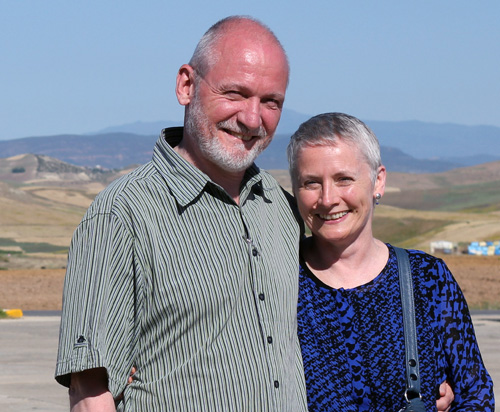
“A really fabulous year” is how English professor Christine Bold describes it; her partner, theatre studies professor Ric Knowles, calls it “a really exciting year.” Actually, it was just 11 months, but either way, the time they spent in Germany was very positive. The couple was in Berlin from September 2013 to August 2014, both of them on sabbatical and working at locations that were just a subway stop apart.
“To be able to go together made it just that much better,” says Knowles.
He had been invited to the International Research Centre for Interweaving Cultures in Performance at the Freie Universtät in Berlin – the first and so far only Canadian to be invited. “My work has been on intercultural theatre, and this institute brings together all the leading scholars from around the world working on the topic.”
Bold was given research associate status at the JFK Institute for North American studies, which she describes as “the best library for U.S. materials outside the U.S.” However, she spent much of her time in archives working on a project funded by a Social Sciences and Humanities Research Council grant.
“My focus is on ‘vaudeville Indians’ – both actual indigenous performers and non-natives who dressed up to play ‘Indians’ in vaudeville. With this opportunity to go to Berlin, I learned that many of the performers had travelled to Europe and I made a plan to look at the archives of various communities to see how they were publicized and what the reviews were like. Berlin at the time was one of the major hubs, and the archives there are really rich.”
The apartment where they stayed was in a building designated for international scholars, and Knowles says they were able to meet researchers from all over the world working on a variety of topics. While in Berlin, Knowles published one book (How Theatre Means), completed work on another (Performing the Intercultural City) and also published several articles.
In addition to working with other scholars in Berlin, they were also able to attend conferences and theatre performances throughout the year. “Theatre in Berlin is hugely exciting,” says Knowles. “One of the surprising and uplifting experiences was seeing that almost every show was sold out, and the age range was from teenagers to those in their 80s. And this was cutting-edge experimental theatre.” He explains that the state theatres in Germany, whether city-run or federal, are supported by the government, and the companies have full-time pay and job security. Ticket prices are kept low; Knowles recalls spending just 10 euros (about $14 Cdn) for an outstanding performance.
With the archives available to her, Bold learned that there were also Europeans who dressed up as ‘Indians’ to perform, and that some of the indigenous performers brought to Europe left the travelling shows they were part of and opted to stay in Europe.
“My project went transnational — something I hadn’t anticipated,” she says. “Through my work I saw the vibrant network of these vaudeville performers.” Although some of the material in the shows fed on stereotypes and could be demeaning or trivializing, Bold says the aboriginal performers forged strong communities; sometimes entire families were involved in the shows. Some also played against the stereotypes: Bold mentions Mohawk performer princess White Deer, who wore men’s headdresses and choreographed versions of dances traditionally performed by men.
For Bold and Knowles, Berlin provided a home base for travels to speak at conferences and explore additional research opportunities. Knowles gave presentations in Germany, Morocco, Poland, England, the United States (Baltimore, Md.) and New Zealand. He was especially excited about the chance to see and learn more about the variety of theatre in the Arab world during his time in Morocco.
Bold’s speaking opportunities were in Denmark, the United States (Berkeley, Calif.), Holland, Germany and England. “It was so stimulating to be able to be in conversations with scholars from around the world, who don’t ask the same questions or think the same way as I am used to,” Bold says. “It felt like a renewal of intellectual energy for me.”
Knowles agrees. “One thing that can happen as a researcher is that we can get locked in little individual boxes. The institute quite deliberately brings people together with different points of view, and I think it is the most enlightened way of promoting scholarship that I’ve encountered.”
Now that their sabbatical year is over, Knowles says he has already been invited back to the institute, and Bold also has an invitation to speak in Finland. They both see their experiences as enriching their future teaching and research at U of G with new enthusiasm and ideas.